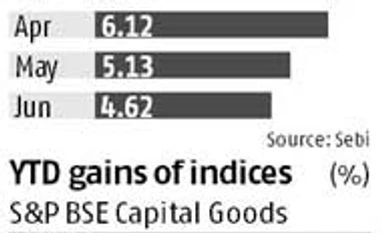This is due to the broad-based rally in the stock markets over recent months. FMCG, once a must-have sector in fund managers’ portfolio, classified as a ‘defensive’ set of stocks, worth investing when things are down, has since taken a back seat. A mere 4.62 per cent of overall equity assets deployed in stocks have gone into shares of FMCG companies. Of the Rs 2.54 lakh crore in stocks, only Rs 11,785 crore is in scrips of FMCG companies.
Fund managers say there has been pressure on volume growth of FMCG companies, on the back of high inflation and reduced discretionary spending. Though they do not see any problem in the structural growth story of the sector, they say there are other opportunities in the market, as several sectors are trading at much cheaper valuations. It has made them do away with FMCG for the time being. Of course, uncomfortably higher valuations of many of these counters have rendered these unattractive.
Mahesh Patil, co-chief investment officer (CIO) at Birla Sun Life Asset Management, says: “We are positive on most sectors except consumer staples, where the slowdown in volume growth and high valuations render it less attractive.”
The shift is clearly towards cyclicals — financials, capital goods stocks and mining, among others. During the past year, there has been a cautious approach towards defensives, FMCG in particular, owing to stretched valuations.
Agrees U R Bhat, managing director of Dalton Capital Advisors, “FMCG companies had a fantastic run when cyclicals were not doing well. Investors are going to do some sector rotation, since money will migrate to sectors that can generate better returns. The valuations of FMCG appear stretched.”
The year-to-date returns from the FMCG index are at an unacceptable level of about five per cent, at a time when key benchmark indices have gained nearly 21 per cent. Further, during the same period, the banking and capital goods indices offered returns of 34 per cent and 53 per cent, respectively.
Presently, shares of banks account for nearly 22 per cent of the total equity assets; information technology has a little over 10 per cent of MFs’ equity corpus. Automobiles (including ancillaries), cement and capital goods have seen a substantial rise in exposure in fund managers’ portfolio.
“In a distressed cycle, the markets reward efficiency and earnings power. Defensives move to a pole position in such an environment,” says Navneet Munot, CIO of SBI MF.
)